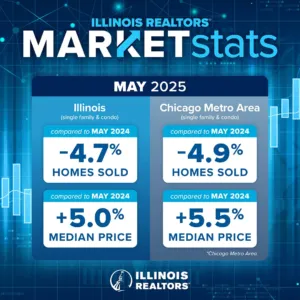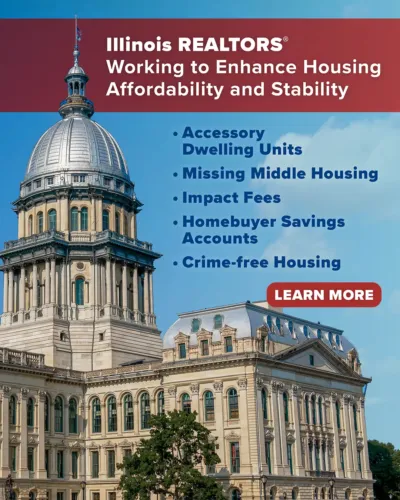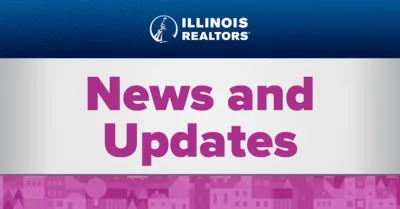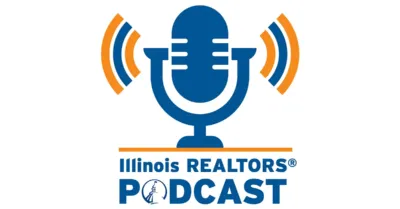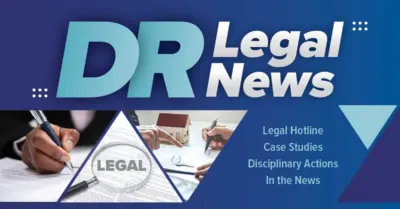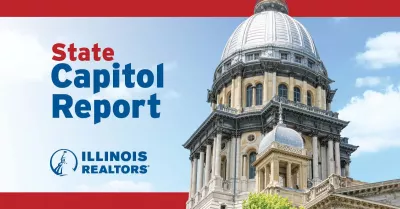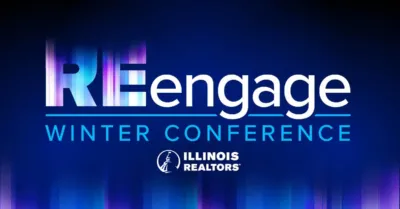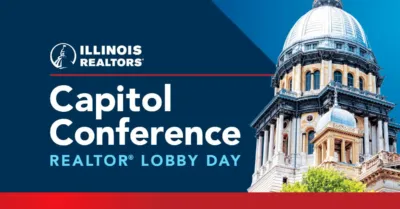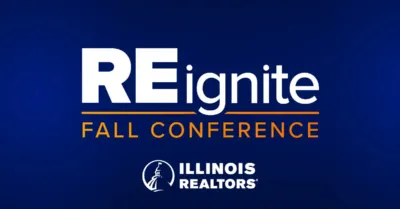May 31, 2024 State Capitol Report
Final Week in Springfield
Our protection of private property rights and our fight for housing stability and affordability had some success and greatly increased lawmakers awareness of the issues. Your State Legislative Team spent the final week working on last minute problematic legislation, and even needed to mobilize REALTOR® members with a Call for Action in the Senate. It was a very long, exhausting and chaotic final 10 days of session, but REALTORS®, the real estate industry and private property rights were well represented and had what can only be considered a very successful final year of the 103rd General Assembly.
One of the key successes for us and consumers is the agreement to make changes to the disclosure of compensation that now will require if a buyer or seller has an agreement with any broker, it must be a WRITTEN agreement and must disclose the exact amount that will be compensated to all parties. It also provides that for licensure as a managing broker, the person must personally take and pass a written examination on Illinois specific real estate brokerage laws authorized by the Illinois Department of Financial and Professional Regulation (IDFPR). Illinois REALTORS® worked with IDFPR to make necessary changes to Real Estate License Act of 2000. Read more about SB 3740 below.
On the House side we had the following successes
This bill creates the Landlord Retaliation Act. Provides that an action is not retaliatory if the landlord can prove (i) a legitimate, non-retaliatory basis for the action; or (ii) the landlord began the action before the tenant engaged in the protected activity. Provides that the rebuttable presumption does not arise if the protected tenant activity was initiated after the alleged act of retaliation. Through negotiations, your State Legislative Team was able to implement a lot of changes to the original bill. The amended version now mirrors the Chicago ordinance. This bill passed both chambers on May 25, 2024, and takes effect on Jan. 1, 2025.
This bill amends the Home Equity Assurance Act. In provisions authoring a governing commission with no less than $4,000,000 in its guarantee fund to establish a Low Interest Home Improvement Loan Program, provides that the loan may be used for repair or maintenance of a guaranteed residence’s water and sewer pipes and repair of a guaranteed residence, including, but not limited to, basement repairs, following flooding damage or other natural disaster damage to the property (rather than following flooding damage to the property). Provides that a commission may use loan funds to issue a grant or rebate for repairs, maintenance, remodeling, alteration, or improvement of a guaranteed residence for purposes of preventing or repairing damage as a result of a natural disaster, including, but not limited to, flooding. Illinois REALTORS® State Legislative Team monitored this legislation that passed and will take effect on Jan.1, 2025.
On the Senate side we had the following successes
This bill amends the Illinois Human Rights Act by extending the date to file a charge from 300 calendar days to two years for an alleged violation under the Act except for the Real Estate Transactions Article. Replaces everything after the enacting clause. Amends the Illinois Human Rights Act. At the suggestion of REALTORS®, the bill was amended to exclude real estate transactions. The bill passed and will become effective on Jan. 1 2025.
This bill the Fire Sprinkler Contractor Licensing Act to require a fire sprinkler inspector be employed by a single fire sprinkler contractor at a time to perform fire sprinkler inspections (rather than be employed by a fire sprinkler contractor). Adds language that provides that nothing in the Fire Sprinkler Contractor Licensing Act shall be construed to prohibit an individual who is licensed as a fire sprinkler inspector from being employed by another employer or self-employed to perform duties that would not require a fire sprinkler inspector license. Illinois REALTORS® monitored this bill closely. In addition, the fire sprinklers missing word? offered to visit individual real estate offices to provide information on fire sprinklers. The bill passed and is set to become effective on Jan. 1, 2024.
This bill creates the Forest-Wetlands-Prairies Act to shall prepare and maintain a comprehensive Forests, Wetlands, and Prairies Grant plan for the preservation and enhancement of forests, prairies, and wetlands in Illinois. Provides that the Illinois Department of Natural Resources, pursuant to the comprehensive plan and subject to appropriation, shall establish and administer a Forests, Wetlands, and Prairies Grant Program to restore degraded forest lands and native prairies, and to promote the growth of native vegetation that remove carbon dioxide from the atmosphere and help to mitigate the impact of climate change. Provides that units of local government are eligible to submit a grant proposal in a format and at a time prescribed by the Department of Natural Resources. Provides that grants may be used by units of local government to fund: (1) local projects restoring or expanding forests, wetlands, prairies, or other natural landscapes demonstrated to absorb carbon dioxide from the atmosphere; (2) education and marketing regarding local projects or steps community members may take to promote the growth of native vegetation that removes carbon dioxide from the atmosphere; and (3) any other purpose approved by the Department of Natural Resources that advances the State goal that there be no overall net loss of the State’s existing forest, prairie, or wetland acres or their functional value due to State-supported activities. Amends the Department of Natural Resources Act and the State Finance Act to make conforming changes. Your Illinois REALTORS® State Legislative Team monitored this legislation which passed in both houses and is expected to become law on Jan. 1, 2025.
This bill amends the Mobile Home Landlord and Tenant Rights Act to prohibit a park owner from evicting a tenant on the grounds of non-payment of rent if the park has not applied for its license or its license renewal and failed to submit all fees due and payable under the Mobile Home Park Act. Provides that non-payment of rent may not be used as a reprisal if the park has failed to apply for its license or renewal of its license and failed to submit all fees due and payable under the Act. Requires the park to be licensed to operate a mobile home park by either the Illinois Department of Public Health or applicable home rule jurisdiction. Pursuant to the Act, this license shall expire April 30 of each year, and a new license shall be issued upon proper application and payment of the annual license fee. After an amendment to this bill, REALTORS® were NEUTRAL. The bill passed and is expected to become effective on Jan. 1, 2025.
This bill amends the Mortgage Foreclosure Article of the Code of Civil Procedure regarding on-line auctions. Allows a judge, sheriff, or other person to conduct a judicial foreclosure sale online in accordance with the Article. Allows the person conducting the sale to engage a third-party online sale provider to assist with performance of the online sale and charge an additional fee as a reasonable expense of the sale for costs associated with conducting the sale online. Deletes the provision that in a judicial sale the person conducting the sale has the discretion to set the terms of sale. Provides that the sheriff or other person conducting the sale may charge an additional fee as a reasonable expense of the sale for costs associated with conducting the sale online. Requires that the purchaser must provide the sale deposit, if applicable, and the balance due to the sheriff or other person conducting the sale at least 24 hours after the end of the sale, unless otherwise set forth by the sheriff or other person conducting the sale, in a designated form. Provides that in every sale of residential real estate conducted online (1) the sale may be held open for bidding for up to 3 days and extended by the person conducting the sale as needed to allow for all active competitive bidding to occur, counted in accordance with the provisions of the Statutes’ on Statutes; and (2) bidding shall be open to everyone for the entire duration of the bidding period. At the drafter’s admission, the requirement providing for a licensed real estate broker was omitted inadvertently from the bill. Both sponsors have agreed to correct this error with an amendment. The bill is expected to become effective on Jan. 1, 2025.
This bill amends the Mobile Home Landlord and Tenant Rights Act to require a mobile home park owner to provide written notice to the officers of the homeowners’ association if the park is offered for sale including in the notice the price and terms and conditions of the sale. Provides that the mobile homeowners, through their association, have the right to purchase the park if the association meets the terms of the contract within 60 days of the notice. Provides that if a contract has not been executed within that 60-day period, the park owner has no further obligations under this Act unless the owner thereafter offers the park for sale at a materially lower price than the price specified in the notice. Defines “materially lower price” as 20% or more lower than the initial offer of sale. Provides that the homeowners have 10 days to meet the terms of this lower offer. Makes a number of exemptions to this requirement. Authorizes the park owner to record in the county in which the park is located an affidavit that the owner has complied with the Act’s requirements. Requires that if the homeowners wish to exercise the rights under this Act, they must form an association that must be a corporation or a not-for-profit corporation with the written consent of two-thirds of all of the mobile homeowners. After an amendment, Illinois REALTORS® was NEUTRAL on this legislation that passed and is expected to become law on Jan. 1, 2025.
This bill amends the Property Tax Code. Provides that the abatement for property located in an area of urban decay also applies to newly remodeled single-family or duplex residential dwelling units (currently, only newly constructed single-family or duplex dwelling units). Provides that provisions requiring the abatement to be reduced in 20% increments annually during the last four years of the abatement period apply only to abatements granted prior to the effective date. Illinois REALTORS® monitored this legislation that passed and will become law upon the Governor’s signature.
This bill creates the the State Historic Preservation Board. Provides that the State Historic Preservation Board shall consist of nine voting members appointed by the Governor (rather than nine voting members appointed by the Governor with the advice and consent of the Senate). Makes changes to the composition of the Board. Provides that the Governor may remove a Board member for just cause. Provides that the Department shall provide administrative support to the Board. Removes distinctions between State Historic Sites, State Memorials, and Miscellaneous Properties. Authorizes the Board to modify, remove, or add to the list of State Historic Sites. Provides that the renamed Illinois National Register Advisory Council shall consist of nine members (rather than 15), starting on Jan. 1, 2025. Makes changes to the composition of the Council. Provides for quorum rules, as well as applicability of the Open Meetings Act and Freedom of Information Act. Adds definitions. Makes technical and other changes. Effective immediately, except that the changes made to the Illinois Historic Sites Advisory Council Act take effect on Jan. 1, 2025. Illinois REALTORS® closely monitored this legislation.
This bill amends the Real Estate Transfer Tax Law in the Property Tax Code. Provides that paper revenue stamps shall be phased out by Dec. 31, 2025. Requires counties to issue electronic revenue stamps or alternative indicia thereafter. Effective upon the Governor’s signature of the bill that passed on May 17, 2024.
This bill amends the Housing is Recovery Pilot Program Act. Provides that an individual is eligible to receive a Housing is Recovery bridge rental subsidy for purposes of stabilizing his or her mental illness or substance use disorder if: (1) the individual is at high risk of unnecessary institutionalization who is 18 (rather than 21) years of age or older, or is aging out of guardianship under the Department of Children and Family Services, and who is eligible to enroll in, or is enrolled in, Medicaid for purposes of receiving mental health treatment; or (2) an individual at high risk of overdose who is 18 (rather than 21) years of age or older, or is aging out of guardianship under the Department of Children and Family Services, and who is eligible to enroll in, or is enrolled in, Medicaid for purposes of receiving substance use treatment. Illinois REALTORS® monitored this legislation which passed. It will become effective on Jan. 1, 2025.
This bill creates the Pesticide Application on Rights-of-Way Notification Act. Provides that at least 24 hours before the state or a unit of local government, including a mosquito abatement district or a commercial entity hired by the State or a unit of local government (rather than the state or a unit of local government), applies a pesticide, including a pesticide intended to control mosquitoes (rather than a pesticide), to a public right-of-way that is located within the corporate boundaries of a municipality, the state, mosquito abatement district, or other unit of local government (rather than the state or the unit of local government) in which the application is to be made shall provide written notice to the public of the application of the pesticide, with certain notice information requirements, with notice sufficient if posted in newsletters, calendars, or other correspondence currently published by the state or the unit of local government in which the application is to be made (rather than to all residents whose residences are located within 200 feet of the public right-of-way to be treated, with notice sufficient if posted in newsletters, calendars, or other correspondence currently published by the state or the unit of local government in which the application is to be made). Provides that the state or a unit of local government, including a mosquito abatement district, need not comply with certain notice requirements if the application of pesticide is in response to (i) disease causing agents in vector mosquitoes, (ii) the occurrence of mosquito-borne disease in animal or human populations, or (iii) a natural disaster recovery effort. Illinois REALTORS® monitored this legislation that passed and will become effective on Jan. 1, 2025.
An Illinois REALTORS® initiative, this bill to create the Illinois Home Buyer Savings Accounts Act was introduced for discussion purposes. On May 22, 2024, Illinois REALTORS® President Matt Silver provided testimony on the bill to the Senate Revenue Committee. The committee appreciated his testimony. Discussion on this bill will continue with legislators and other stakeholders. The bill provides that a first-time and second-chance homebuyer may open an account with a financial institution designated in its entirety by the financial institution as a first-time and second-chance homebuyer savings account. Provides that the funds in a first-time and second-chance homebuyer savings account may be used only to pay a first-time and second-chance homebuyer’s eligible cost for the purchase of a single-family residence in Illinois. Provides that 2 first-time and second-chance home buyers may jointly own a first-time and second-chance homebuyer savings account. Provides that only cash and marketable securities may be contributed to a first-time and second-chance homebuyer savings account. Sets forth provisions concerning the responsibilities of an account holder; the responsibilities of financial institutions; deduction of contributions, exclusion of earnings, and limitations; the penalty for withdrawal for purpose other than eligible costs; and the forms the Illinois Department of Revenue must adopt.
This bill amends the Residential Mortgage License Act of 1987. Provides that, prior to taking any legally binding action on a shared appreciation agreement, the borrower or borrowers shall be provided specified counseling regardless of the county in which the property is located. Provides that the borrower may not waive counseling. Provides that the Secretary of Financial and Professional Regulation may adopt rules relating to shared appreciation agreements. Defines “shared appreciation agreement” and includes shared appreciation agreements within the definition of “mortgage loan”, “residential mortgage loan”, or “home mortgage loan”. Defines “shared appreciation agreement” as a writing evidencing a transaction or any option, future, or any other derivative between a person and a consumer is which the consumer receives money or any other item of value in exchange for an interest or future interest in a dwelling or residential real estate or a future obligation to repay a sum on the occurrence of an event, such as (i) the transfer of ownership, (ii) a repayment maturity date, (iii) the death of the consumer, or (iv) any other event contemplated by the writing. Amends the Residential Real Property Disclosure Act. Defines “counseling”. Illinois REALTORS® monitored this bill that passed and will become law upon the Governor’s signature.
This bill creates the Summary of Rights for Safer Homes Act to require the Illinois Department of Human Rights to create a summary form advising tenants who have suffered domestic violence or sexual violence of the rights that they have under Illinois law that provide protection in their ability to have safe housing. Requires landlords to attach a copy of the summary as the first page of any written residential lease entered into with a tenant. In order to give landlords more time to change their leases, the sponsors accepted Illinois REALTORS®’s amendment to make the effective date of this act Jan. 1, 2026.
This bill creates the Business Improvement District Law. Provides for the establishment of business improvement districts by a municipality by ordinance after petition by property owners, creation of a district plan, notice, and hearings. Provides that a business improvement district may impose district charges on property owners whose real properties are located within the business improvement district. Provides that the board of directors of a business improvement district shall administer or implement activities and improvements specified in the district plan unless the board contracts with a district management association to do so. Contains provisions relating to district plans, formation of a district, district boundaries, terms and renewal of districts, amendment to district plans, governance of the district, reports of the board of directors of a business improvement district, contesting the validity of a business improvement district, district plan, or district charge, dissolution, and legislative purpose. Provides that the Act applies only to municipalities having a population exceeding 500,000. This bill was an initiative of the City of Chicago and also included several business organizations. Illinois REALTORS® monitored this legislation that will take effect upon the Governor’s signature.
This bill amends the Rivers, Lakes, and Streams Act to removes several provisions including requiring the EPA to work with the City of Chicago and other affected units of government for specified concern; require the EPA to conduct water and lake bed surveys to evaluate the ecology and the quality of water in Lake Michigan, and removes a provision concerning reporting requirements. Provides that the EPA to regularly monitor water quality from nearshores, harbors, and public water supply intakes in Lake Michigan and provide an executive summary biennially on conditions of the water quality in Lake Michigan to the Governor and members of the General Assembly. This bill passed both houses and is expected to become law on Jan. 1, 2025. Illinois REALTORS® monitored this legislation.
This bill has been introduced to fill possible gaps in the protection of certain wetlands after the U.S. Supreme Court ruled the government overreached in the exercise of its authority in the case Sackett v. EPA in 2023. These wetlands, referred to as non-jurisdictional wetlands because they do not fall under the jurisdiction of the U.S. Army Corps of Engineers, are oftentimes hard to identify, have minimal impact on drainage or environmental quality, and have the potential to impact virtually every sector of the economy if regulated in an ineffective manner.
After several meetings with the sponsor, many organizations including the Illinois REALTORS® continue to oppose this legislation. Through the summer as you meet with legislators, please urge them to oppose this proposal for the following reasons:
- SB 771 would cover wetlands that WERE NEVER regulated under the federal “connection to a Water of the United States” standard for wetlands protection, well beyond those wetlands that supporters claim they seek to cover after the Sackett decision.
- SB 771 does NOT include all of the exemptions to federal wetlands regulation promulgated under the Clean Water Act, further calling into question the types of non-jurisdictional wetlands that will be covered by the proposal.
- SB 771 would cover virtually any accumulation of water, regardless of size.
- SB 771 would cover wetlands that WERE NEVER regulated under the federal “connection to a Water of the United States” standard for wetlands protection, well beyond those wetlands that supporters claim they seek to cover after the Sackett decision.
When the House and Senate returned to Springfield last week is was to be the final week of the spring session and with the end goal of passing a budget for fiscal year 2025. Monday and Tuesday last week brought long caucus meetings with closed door deliberations and budget discussions. Wednesday through Friday were three very chaotic days as it was the final attempt to pass any substantive bills before the budget became the only legislative matter remaining. The very first version of the budget was introduced on Friday, and the BIMP (budget implementation bill) and Revenue Package were introduced on Saturday. The House sent their members home and adjourned on Saturday, knowing they would have to return once the Senate had passed the budget. The final and remaining components of the budget were filed on Sunday and much later that night and into the morning the Senate finally passed the budget and all related bills and immediately adjourned for the summer. Following the holiday members of the House returned to Springfield on Tuesday and concluded with one of the more interesting final days of session of memory. House Democrats struggled to reach complete agreements within their own party, which led to not always having the required amount of votes needed to pass all components of the budget. But after hours and hours of debating, caucus meetings, roll call verifications and even suspending House Rules, a $53.1 billion state budget was finally passed around 5:15 a.m. Wednesday morning.
At-A-Glance
Legislators will enjoy their summer break before returning in the fall for Veto Session, which due to the extended spring session, does not have dates scheduled at the moment. THANK YOU for engagement, support and for staying tuned in all year! Also, be on the lookout for a comprehensive legislative review of all REALTORS® issues and initiatives that were addressed in 2024.

